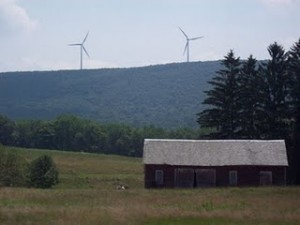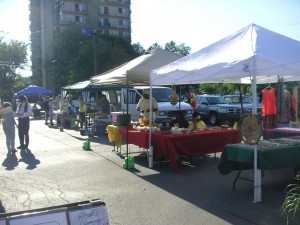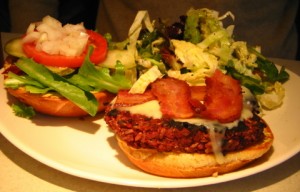In many ways farmers are at the forefront of the movement toward sustainable change. They are the industry that has seen the most change in consumer behavior in the name of environmental stewardship. Note the amazing growth the farmer’s market segment of food retail in the last years. Maybe this is because food directly affects families’ health as well as the environment, local economies, and food security? Perhaps it is because the link between action and personal or environmental benefit is tangible and immediate? Rachel surely knows more than I do on these topics (specifically how many people have NOT made these connections and changed behaviors) so I’ll stop there.
We’ll have more posts about farmers, food, sustainable agriculture, etc as this is Rachel’s passion but I wanted to tell a quick story about farmers’ going beyond compliance with USDA organic guidelines and expectations of good behavior at a conference to “go green.”
Years ago, (2006?)  I attended a session with some small farmers while at a giant conference the Pennsylvania Association for Sustainable Agriculture hosts annually. I was invited to this conference by the owners of Northstar Cafe, which you can find discussed in my first Small Infinity story., and found it to be highly relevant and inspiring. I saw both Sandra Steingraber and John Ikerd speak at this conference- more on those too soon as both of them remain on my list of influential thinkers.
I attended a session with some small farmers while at a giant conference the Pennsylvania Association for Sustainable Agriculture hosts annually. I was invited to this conference by the owners of Northstar Cafe, which you can find discussed in my first Small Infinity story., and found it to be highly relevant and inspiring. I saw both Sandra Steingraber and John Ikerd speak at this conference- more on those too soon as both of them remain on my list of influential thinkers.
Man do I digress…
The title of the session, something vague about connecting small farms to wind power, attracted enough participants to fill the room. The speaker, on the other hand, wasn’t exactly attracting the attention of the crowd. It turns out the crowd was filled with mostly farmers who wanted the speaker to enable action- steps, contacts, cost analysis, how-to stories- while the speaker was filled with lots of information on high-level policy of wind power on small farms. The tension of the mismatch was palpable.
By the end of the session, the audience was acting like a classroom of 4th grade girls during study hall. I saw people whispering and passing notes everywhere. From my spot in the midst of the farmers, I overheard people saying things like “here talk to these people” and noticed that the people “in the know” about HOW to get wind power on small farms were cranking out as many little notes as their pocket of crumpled receipts would permit.
Lesson: Small Infinities enable each and are open to opportunity beyond expectation.


